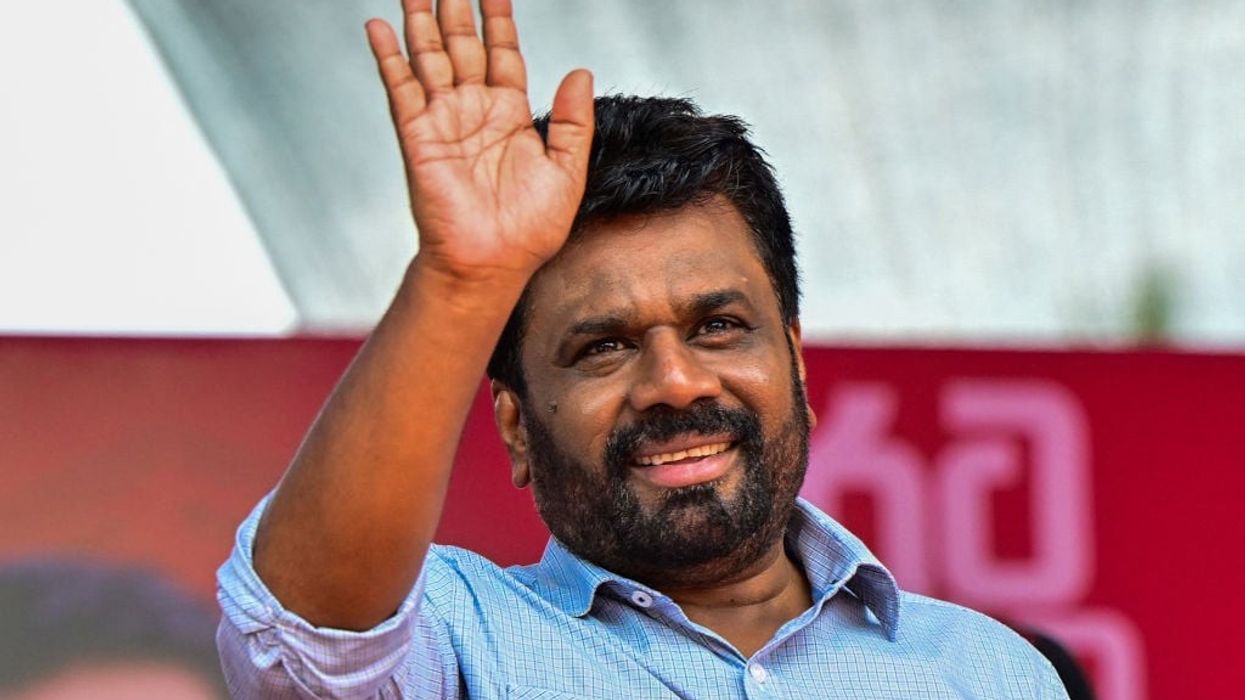SRI LANKA's Marxist president-elect on Sunday (22) invited his compatriots to help him "rewrite" history in the cash-strapped island nation after winning a vote coloured by discontent over an unprecedented financial crisis.
Anura Kumara Dissanayaka, the 55-year-old leader of the People's Liberation Front, was declared the winner of the weekend's poll with nearly 1.3 million more votes than his nearest rival.
The once-fringe leader, whose party won less than four per cent of the vote in parliamentary elections four years ago, saw a surge of support as the economic meltdown forced widespread hardships upon Sri Lankans.
"The dream we have nurtured for centuries is finally coming true," he said in a statement shortly after the announcement.
"This victory belongs to all of us," he added. "Millions of eyes filled with hope and expectation push us forward, and together, we stand ready to rewrite Sri Lankan history."
Outgoing president Ranil Wickremesinghe -- who took office at the peak of the 2022 economic collapse and imposed tough austerity policies per the terms of an IMF bailout -- was a distant third in the contest with 17 per cent of the vote.
"History will judge my efforts, but I can confidently say that I did my best to stabilise the country during one of its darkest periods," he said in a statement.
He congratulated Dissanayaka on the win and said he was "confident" the politician would "steer Sri Lanka on a path of continued growth and stability."
Dissanayaka will be sworn in on Monday (23) morning at the colonial-era President Secretariat in Colombo, election commission officials said.
Economic issues dominated the eight-week campaign, with widespread public anger over the belt-tightening measures imposed by Wickremesinghe since the peak of the island nation's bruising financial crisis.
Dissanayaka would "not tear up" the IMF deal but would seek to modify it, a party politburo member said.
"It is a binding document, but there is a provision to renegotiate," said Bimal Ratnayake.
He said Dissanayaka had pledged to reduce income taxes that were doubled by Wickremesinghe and slash sales taxes on food and medicines.
"We think we can get those reductions into the programme and continue with the four-year bailout programme," he said.
Dissanayaka's once-marginal Marxist party led two failed uprisings in the 1970s and 1980s that left more than 80,000 people dead.
But Sri Lanka's crisis has proven an opportunity for Dissanayaka, who has seen a surge of support based on his pledge to change the island's "corrupt" political culture.
Around 76 per cent of Sri Lanka's 17.1 million eligible voters cast ballots in Saturday's (21) poll.
Dissanayaka's party sought to reassure India that any administration he led would not be caught up in geopolitical rivalry between its northern neighbour and China, the country's largest lender.
New Delhi has expressed concerns over what it sees as Beijing's growing influence in Sri Lanka, which sits on vital shipping lanes criss-crossing the Indian Ocean.
"Sri Lankan territory will not be used against any other nation," Ratnayake said.
"We are fully aware of the geopolitical situation in our region, but we will not participate."
Wickremesinghe sought re-election to continue the austerity policies that stabilised the economy and ended months of food, fuel and medicine shortages during Sri Lanka's economic meltdown.
His two years in office restored calm to the streets after civil unrest spurred by the downturn saw thousands storm the compound of his predecessor Gotabaya Rajapaksa, who then fled the country.
Thousands of police were deployed to keep watch over voting on Saturday.
A temporary curfew was imposed after polls closed, despite police reporting that there had been no violence during or after balloting.
No victory rallies or celebrations are permitted until a week after the final results are declared.
(AFP)





